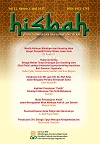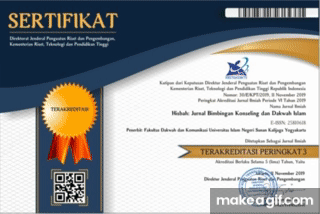POLA ASUH ORANG TUA SANTRI TAHFIZ HUBUNGANNYA DENGAN RELIGIUSITAS DAN KEPRIBADIAN
DOI:
https://doi.org/10.14421/hisbah.2022.192-01Abstract
It is a challenge for children and parents whose children have dual education, general formal as well as religious education. These challenges include having to manage time, energy and learning activities, in this case parents are required to have extra parenting methods for the success of their children. This study aims to determine the relationship between parenting patterns of tahfiz students with religiosity and personality. The research subjects consisted of 51 parents of students of Tahfiz Gemilang Children and Toddlers, Sleman Regency, Yogyakarta. The research was carried out with mixed methods with quantitative survey research as the main research complemented by qualitative research to explore the findings. The main data collection tool is a questionnaire, equipped with interviews and observations. Multiple linear regression analysis was used to determine the relationship between parenting patterns with religiosity and personality. The results of the hypothesis test prove that there is a significant relationship between parenting patterns of tahfiz students with religiosity and personality with a value of a=54,313; religiosity variable regression coefficient 0.412; and the regression coefficient value of the personality variable is 0.593. The results of the coefficient of determination (R Square) showed that religiosity and personality contributed 25.9% to the parenting pattern of tahfiz students. This study also found that the parenting pattern of tahfiz students was dominated by the authoritarian type (66.7%). This is suspected to be the impact of most of the parents of tahfiz students with a general education background (78.43%) whose religious orientation is of an extrinsic type which tends to be formalistik and rigid.
Keywords: Parenting Pattern, Tahfiz Students, Religiosity, Personality
References
Ahmad, Jumal. Religiusitas, Refleksi, Dan Subjektivitas Keagamaan. Yogyakarta: Deepublish, 2020.
Ahmadi, and Widodo Supriyono. Psikologi Belajar. Jakarrta: Rineka Cipta, 2008.
Azwar, S. Reabilitas Dan Validitas Edisi 4. 4th ed. Yogyakarta: Pustaka Pelajar, 2016.
Bachri, Syamsul, Ikhwan Lutfi, and Gazi Saloom. “Pengaruh Religiusitas Dan Kepribadian Lima Faktor Terhadap Prasangka Sosial Kepada Jama’ah Tablig.” TAZKIYA: Journal of Psychology 01, no. 02 (October 2, 2013): 227–243.
Baumrind, Diana. “Child Care Practices Anteceding Three Patterns of Preschool Behavior.” Genetic Psychology Monographs 75, no. 1 (1967): 43–88.
Buri, J.R. “Parental Authority Questionnaire.” Journal of Personality and Individual Assesment 57, no. 1 (1991): 110–119.
Chairilsyah, Daviq. “Pembentukan Kepribadian Positif Anak Usia Dini.” EDUCHILD 1, no. 1 (2012): 1–7.
DW. “Wawancara Orangtua Anak Didik Rumah Tahfidz Gemilang Anak Dan Balita Sleman,” July 9, 2022.
Enda, Andriarto Kapu. “Pola Asuh Otoriter Dalam Mendidik Anak Di Keluarga Di GKS Kambajawa: Suatu Analisis Pendidikan Agama Kristen Dan Psikologi” 1, no. 1 (2017): 109–134.
Hidayatulloh, Amir, and Muhammad Nur Syamsu. “Religiusitas Intrinsik, Religiusitas Ekstrinsik, Dan Niat Untuk Menghindari Pajak” 7, no. 1 (January 2020): 44–51.
Muallifah. Psycho Islamic Smart Parenting. Yogyakarta: Diva press, 2009.
Orangtua Anak Didik. “Observasi Orangtua Anak Didik Pada Saat Kegiatan Tarbiah Jasadiyah,” October 21, 2021.
Pace, Stefano. “Effects Of Intrinsic And Extrinsic Religiosity On Attitudes Toward Products: Empirical Evidence Of Value-Expressive And Social-Adjustive Functions.” The Journal of Applied Business Research 30, no. 4 (2014): 1227–1238.
Puspitasari, Rety, Dwi Hastuti, and Tin Herawati. “Pengaruh Pola Asuh Disiplin Dan Pola Asuh Spiritual Ibu Terhadap Karakter Anak Usia Sekolah Dasar.” Jurnal Pendidikan Karakter V, no. 2 (2015): 208–218.
Santrock, J.W. Life Span Development, Perkembangan Masa Hidup. Jakarrta: Erlangga, 2012.
Sari, Desi Kurnia, Sri Saparahayuningsih, and Anni Suprapti. “Pola Asuh Orangtua Pada Anak Yang Berperilaku Agresif (Studi Deskriptif Kuantitatif Di TK Tunas Harapan Sawah Lebar Kota Bengkulu).” Jurnal Ilmiah Potensia 3, no. 1 (2018): 1–6.
Satrio, Danang, Arif Budhiharjo, and Dyah Prasetyani. “Hubungan Religiusitas Dan Kepribadian Terhadap Perilaku Prososial Pada Perawat.” Jurnal PENA 34, no. 1 (March 2020): 77–85.
Sondayana, Rostina. Statistika Penelitian Pendidikan. Bandung: Alfabeta, 2014.
Sugiyono. Metode Penelitian Kombinasi (Mix Methods). Bandung: Alfabeta, 2012.
———. Metode Penelitian Pendidikan Pendekatan Kuantitatif, Kualitatif, Dan R&D. Bandung: Alfabeta, 2015.
Sugiyono, and Agus Susanto. Cara Mudah Belajar SPSS Dan Lisrel: Teori Dan Aplikasi Untuk Analisis Data Penelitian. Bandung: Alfabeta, 2017.
Sulaiman, Abu Daud. Sunan Abi Daud. Beirut: al-Maktabah al-Ashriyah, 1952.
Sumiyarsi, Sri. “Pengaruh Antara Pola Asuh Dan Religiusitas Orangtua Dengan Sikap Empati Anak Di Desa Karanganyar.” Universitas Islam Indonesia, 2018. https://dspace.uii.ac.id/handle/123456789/9953.
Suryadi, Bambang, and Bahrul Hayat. Religiusitas Konsenp, Pengukuran Dan Implementasi Di Indonesia. Jakarta: Bibliosmia, 2021.
Yusuf, Syamsu, and Juntika Nurihsan. Teori Kepribadian. Bandung: Rosda Karya, 2007.
“Undang- Undang No 23 Tahun 2002 Tentang Perlindungan Anak,” 2002.

Downloads
Published
Issue
Section
License
Authors who publish with this journal agree to the following terms:
- Authors retain copyright and grant the journal right of first publication with the work simultaneously licensed under a Creative Commons Attribution License that allows others to share the work with an acknowledgement of the work's authorship and initial publication in this journal.
- Authors are able to enter into separate, additional contractual arrangements for the non-exclusive distribution of the journal's published version of the work (e.g., post it to an institutional repository or publish it in a book), with an acknowledgement of its initial publication in this journal.
- Authors are permitted and encouraged to post their work online (e.g., in institutional repositories or on their website) prior to and during the submission process, as it can lead to productive exchanges, as well as earlier and greater citation of published work.











